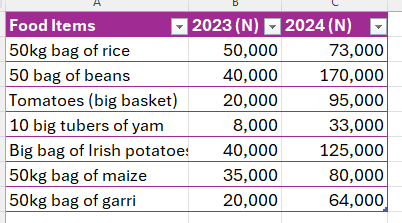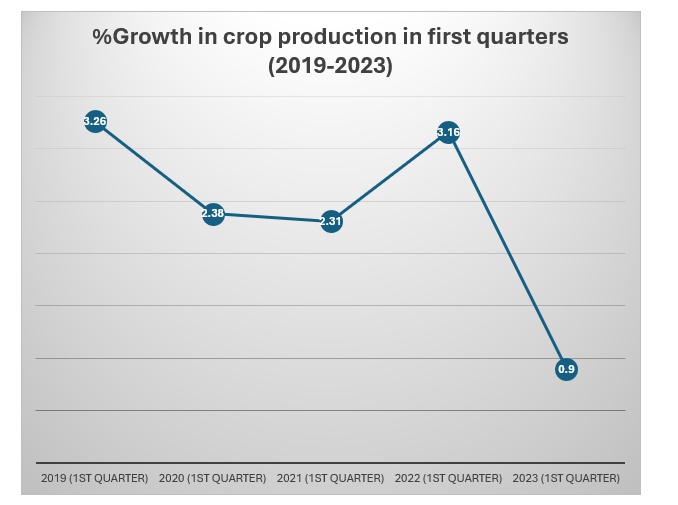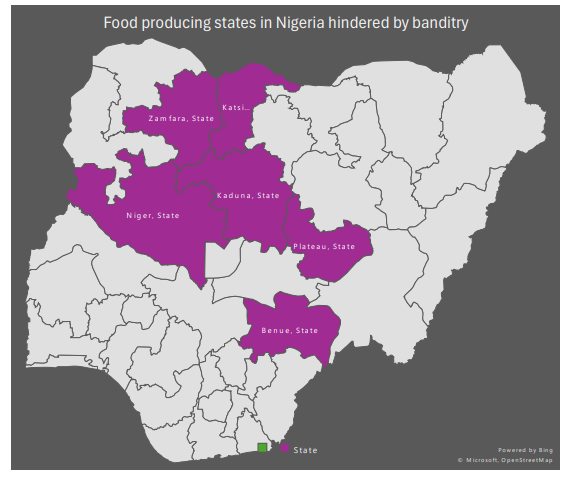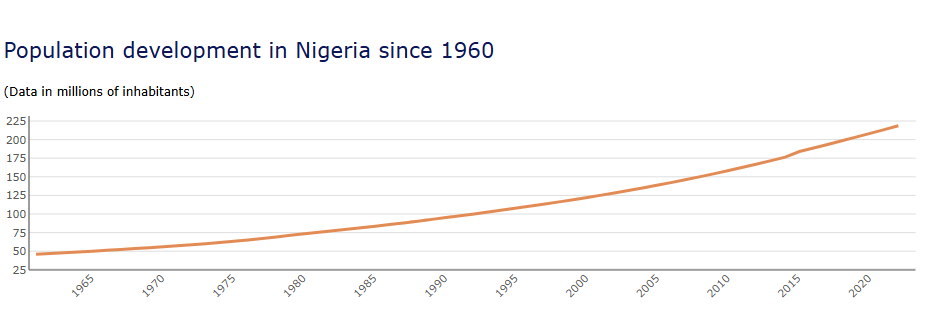[Explainer] Why Nigeria is experiencing food scarcity

By Theophilus Abbah
- Scarcity, not caused by an increase in fuel price and devaluation of the Naira
- Crop production dipped since 2023 due to the activities of bandits
- Farmers in Plateau, Kaduna, Zamfara, Kaduna, Kogi Katsina prevented from planting and harvesting Irish potatoes, yam, rice, tomatoes, pepper, maize
- Waters from Bakalori dam, previously utilized by thousands of farmers, waste away
- ‘Government must reclaim the lands from criminals’
- With technology-based agriculture, Nigeria could produce more food per hectare of land
The prices of locally-produced food items like rice, beans, yam, Irish potatoes, garri, tomatoes, pepper, millet, maize, sorghum, onions, melon, and other vegetables, have jumped beyond the reach of the ordinary Nigerian. But this is neither as a result of the devaluation of the Naira nor the removal of subsidy on petrol. Rather, the hike in the prices of the food items is caused by the outright scarcity. They are not available for sale in rural and urban markets, hence traders deliberately put unreasonable prices on the little they have in stock.
For Nigerians who lived through the period that Muhammadu Buhari was president, from 2015-2023, one of the criticisms against the government was the astronomical inflation that saw the price of a bag of rice, for instance, climbed from N10,000 per a 50kg bag to about N35,000. But in the last one year, the price has jumped from about N50,000, to about N73,000.00.
A 50kg bag of beans is now about N170,000, up from N40,000; 10 big tubers of yam used to cost N8,000; it has now jumped to N33,000. A big bash of Irish potatoes, which used to sell for N40,000, has now climbed to N125,000. A 50kg bag of maize, which used to sell for N35,000, now sells for N80,000; while a 50kg bag of garri that used to sell for N20,000 is now N64,000. The prices above were obtained from a survey of states where these food items were produced in large numbers, like Plateau, Kaduna, Niger, Zamfara, Benue, and Katsina states.

Table showing food prices in 2023 and 2024 Source: The Insight market survey
Crop production dips since first quarter of 2023
In the last six months the growth in crop production has been the lowest since 2019, according to data from the World Bank and other organizations that monitor crop production in Nigeria. The data showed that crop production began to perform very badly since 2021, after reaching about 3.87 percent in the fourth quarter of 2021. The rate of production dipped in the first quarter of 2023 when the growth rate was put at 0.9%. The situation was alarming, compared to the first quarter of previous years. In 2019, the growth recorded was 3.29%; first quarter of 2020 (2.38%); first quarter of 2021 (2.31%) and first quarter of 2022 (3.16%). Though the growth rate in the second quarter of 2023 increased, it did so marginally (1.5%). The low growth rate of crop production in 2023 was a pointer to the difficulties Nigerians have been tossed into in 2024.

Crop production growth in Nigeria (2019-2023) Source: Statista
Bandits have occupied vast expanse of lands and villages, driven farmers into Internally Displaced Persons (IDP) camps, and frustrated food production.
The current food scarcity is not unconnected with the reduction in the rate of food production in the country, and closely related with the activities of bandits who have prevented farmers from accessing farmlands. The situation is very dire in states that are considered to be food producing for the country, like in Benue, Platea Niger, Kaduna, Katsina, and Zamfara States. In each of these states, bandits have occupied vast expanse of lands and villages, driven farmers into Internally Displaced Persons (IDP) camps, and frustrated food production.
Plateau can’t produce enough Irish potatoes
In Plateau state, where the bulk of Irish potatoes, maize, yams were previously produced in large quantities, production has stalled in the last two years, due to attacks and destruction of farms by bandits. One of the most recent of such attacks occurred in multiple villages in Bokkos Local Government Area, a territory renowned for the production of Irish potatoes.
On Christmas Day, December 25, 2023, the bandits invaded 15 villages, destroyed houses and farmland, killing as many as 160 persons. That attack alone meant that farming activities in this Irish potatoes headquarters in Nigeria could not continue. It is, therefore, understandable how the farm produce that cost N40,000 in 2023 has jumped to N120,000 in 2024. The attacks did not stop in December last year. As at April 2024, similar attacks by bandits occurred in several other rural communities in Bokkos LGA, hampering crop production. Barkin Ladi and Shendam areas of Plateau State, which produce maize and acha, came under attack by bandits.
Bandits take over farmlands in Niger State
The situation is worse in Niger State where Gurara, Shiroro, Paiko and Munya Local Government Areas have come under attack by bandits and frustrated food production. Niger State has been the headquarters of yam production in Nigeria for centuries. In Shiroro LGA, bandits did not only stop farmers from going to their farms, but they took over many villages, farmlands and forced the few persons who could still access their farms to pay taxes to the leadership of the banditry. The two main yam markets in Shiroro and Paiko Local Governments have been shut because farmers cannot supply yams to the markets. They can no longer farm yams. For those who sneak into their farm, they have their produce burnt down by bandits. The worst of them all was that even buyers who patronized the yam market from other parts of Nigeria came under attack by bandits, dispossessed of their cash and other valuables. In the market, as at June 2024, yams had become so scarce that traders had to raise the prices of the few they could access from Niger State.

Map showing states that can no longer produce much food due to attacks by bandits. Source: The Insight survey
Farmers can no longer use Bakori dam for crop production
Another state where bandits have hampered crop production is Zamfara State, where the government crafted the state’s slogan as “Farming is our Pride.” The state hosts the huge Bakalori irrigation dam that facilitates the production of crops in the three states of Zamfara, Sokoto and Kebbi States. However, several local governments where farming activities took place, hitherto, have been taken over by bandits, among them Tsafe, Kaura Namoda, Anka, and Shinkafi. Farmers utilized water from the dam even during dry season to produce crops like beans, guinea corn, millet and rice in abundance for consumption in and outside Nigeria. Both Zamfara and Kebbi States were considered the rice headquarters in Northern Nigeria, but that honour is being wiped away by bandits who have taken over villages and continued to impose fines on the few farmers who have bent over backward to yield to the authorities of bandits and paid taxes.
The prices of rice, beans, maize and other crops, produced in Zamfara state, are out of reach for the ordinary Nigerian.
The situation is made worst because of the different bandit camps, who go to the peasants in rural and farming communities to collect taxes one after another. Farmers who cannot earn money until their harvest their crops are put in a very difficult condition. The invasion of Zamfara State by bandits has created a pathetic situation. The Bakalori irrigation dam made it possible for thousands of farmers to engage in farming activities all-year round. Now, this is impossible. Today, the prices of rice, beans, maize and other crops, produced in Zamfara state, are out of reach for the ordinary Nigerian.
Bandits imposed levy on farmers; sacked many from Katsina LGAs
In Katsina State, where maize, Irish potatoes, sorghum, maize, millet, soya bean, pepper, tomatoes, farming activities have come to a halt due to the activities of bandits who sacked many villages and occupied farmlands as their operational territories. Local Government Areas like Dutsin-Ma, Malumfashi, Sabuwa, Bakori and Jibia, where large scale farming activities used to take place, have been taken over by bandits. Bakori, for instance, was one of the parts of Nigeria that used to produce Irish potatoes, but very little can now be produced. Gamja LGA was popular because of its huge dam, utilized by farmers to produce pepper, soya bean, maize, sorghum, etc. The place is now lying fallow. In the days before bandits took over their local governments, Katsina State was renowned for the production of crops which were sold in other parts of Nigeria and exported to neighbouring West African countries.
Food production hampered in 17 LGAs in Benue State
As many as 17 local government areas in Benue State have come under severe attacks by bandits, halting the production of yam, rice, cassava, soya bean, and benniseed. The local government seriously affected include Agatu, Ado, Apa, Mkur, Katsina-Ala and Oturkpo. Others include Makurdi, Gwer-West, Gwer-East, Guma and Ukum LGAs. The economy of Ukum LGA may be considered as the worst, as the international yam market in the area is almost obliterated. Until the bandits halted farming in the area, traders came from all over Nigeria and neighbouring West and Central African countries to purchase yams from Ukum. However, bandits have not only prevented farmers from going to their farmlands, but went to the international yam market and set fire on it, burning to ashes all the yam produce on the farm. In February 2024, other bandits invaded Sankera yam market in the area and burnt it down, in the name of farmer-herders conflict. The senseless destruction of farm produce and farmers has displaced Benue State from is glorious reign as the food basket of the nation.
Until the bandits halted farming in the area, traders came from all over Nigeria and neighbouring West and Central African countries to purchase yams from Ukum
One farmer can’t produce 100+ bags of crops in Kaduna State anymore
Farmers in some communities in Kaduna State could boast of producing more than 100 bags of rice, maize, guinea corn, Irish potatoes, millets, and hundreds of tubers of yam in the last few years. In the last four or five years, this has not been the case, because bandits have appropriated their lands and driven them out, displaced in different parts of Kaduna State or Nigeria, without being engaged in farming activities. The farming communities mostly affected are located in the following local government areas: Giwa, Igabi, Birnin-Gwari, Kajuru, Kachia, Chukun and Kagarko, where farmers no longer access their farms, and the few who have remained under the rule of bandits are made to pay levies to bandit leaders.

Senator Kyari, Minister of Agriculture
We must ‘fight and secure’ the lands from bandits – Brigadier-General Bala
To deal with the insurgency that has hampered food production across Nigeria, a security expert, Brigadier General Saleh Bala and Executive Director of the Centre for Strategic and International Studies (CSIS), told The Insight that government must use the military to engage in “massive domination” for the recovery of territories from destructive bandits. Nigeria needs to “fight and secure the areas” taken over by bandits, but this cannot be achieved without boosting the capacity of security agencies to do so. He advocated the recruitment of more men and the procurement of better equipment to face what he called “the long war” against the insurgents.
Soldiers who fight this kind of war should be using armoured trucks when taking the battle to bandits
Brigadier Bala explained his position thus: “In the current situation, between few soldiers are deployed to fight a battle that about 300 soldiers should fight. This is not possible. Here and then you hear about bandits ambushing military Hilux vehicles, killing some of our men. Elsewhere, soldiers who fight this kind of war should be using armoured trucks when taking the battle to bandits. Our soldiers are not fighting with the right equipment. We are not yet doing the right things. We need a kinetic approach to this war, to recover the territories. Even if we begin to do the right thing, it will take not less than two years to seize the lands from bandits.”
Government must deploy technology to increase yield per hectare – Prof Kuta
A professor of Agriculture at the University of Ibadan, Dr Mohammad Yahaya Kuta, who hails from bandits-ravaged Niger State, told The Insight that in as much as government was expected to take out bandits from farmlands, the food scarcity in the country was caused by the failure of governments over the years to fund research for high-yield seedling and the kind of technology that can increase the yield per hectare of land in Nigeria.
We must create a roadmap for Nigeria’s agriculture, and deploy modern technology to boost crop production
“If bandits are operating in one part of the country, we should used technology to boost the yield per hectare of land in the places that are safer,” he argued. “The problem we have is that government prefers to give road contracts through which funds could be misapproriated, than to fund agriculture research institute to come up with high-yield varieties of crops per land. A country like Vietnam has deployed technology for its agriculture; it’s not bigger than Niger State, but it produces a lot of food. Even countries at war, like Ukraine, produce excess food for its people, using technology. Today, the world is talking about precision agriculture and even soilless agriculture. But where are we? We don’t have extension workers; farm inputs are too expensive; government is not subsidizing agriculture; our irrigation dams are abandoned. These were not done by bandits, but are caused by government’s inaction. To overcome the current food scarcity, we must create a roadmap for Nigeria’s agriculture, and deploy modern technology to boost crop production.”
Even countries at war, like Ukraine, produce excess food for its people, using technology
Apart from the activities of bandits across Nigeria, food scarcity may be linked to other factors like to unmanageable growth in Nigeria’s population, which is far below food production; the abandonment of over 400 dams built by the First and Second Republic governments; lack of sustainability and continuation of World Bank agricultural development projects, which gingered food production in the 1980s and 1990s; and the poor management of commercial farms, making them to fold up before bandits invaded and rendered them unproductive.

Nigeria’s population growth (1965-2020)
The Insight Report
Nigeria Coverage




Abdullahi says:
Quite an extensive coverage.
Olamide says:
Nice. Quite extensive. Kudos.